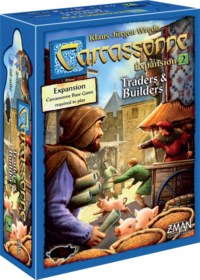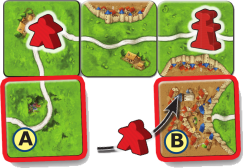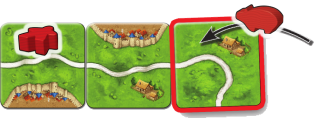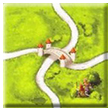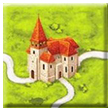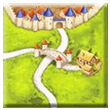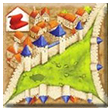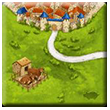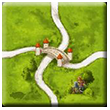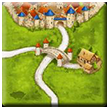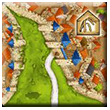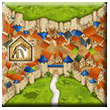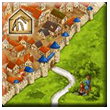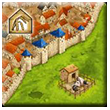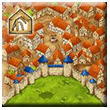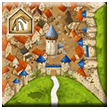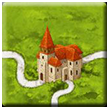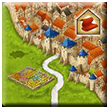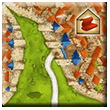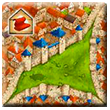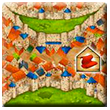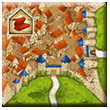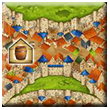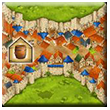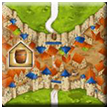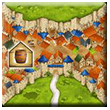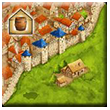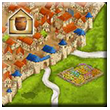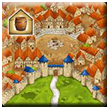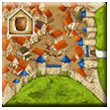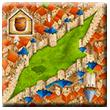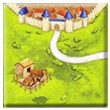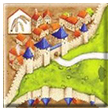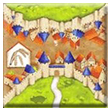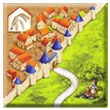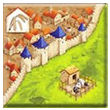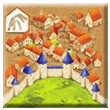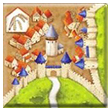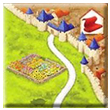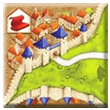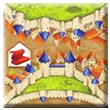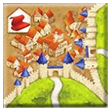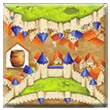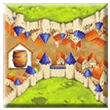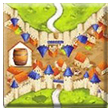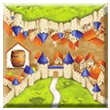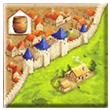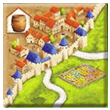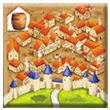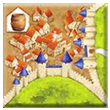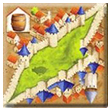Traders and Builders
 |
You are reading the rules for this tile design. |  |
 | Read the following rules if your tiles look like this. |
| If your tiles have a different design, then choose a game from Spin-offs. |  |
General info and comments
Traders and Builders was originally released by HiG for the second edition, known as C2 for short, in 2015. A third edition, known as C3 for short, was released in 2021 including more detailed graphics, cities with clipped buildings and some minor wording changes. Currently, the C3 version of this expansion is only available as part of Big Box 7.
This expansion was originally released for the 1st Edition, known as C1 for short, in 2003.
Copies of this expansion in C2 printed in the period 2015-2016 have the darker city backgrounds.
This expansion introduces new tiles as well as goods tokens. These tokens are collected when completing cities and scored at the end of the game. Two new figures are also introduced:
- Builders, a special figure that grants double turns
- Pigs, a special figure that provides additional points when scoring fields
Contents
- 24 landscape tiles (identified with expansion symbol), including 9 with Wine, 6 with Corn, and 5 with Cloth
- 6 pigs
- 20 goods tokens (9x Wine, 6x Wheat and 5x Cloth)
- 6 builders
- 1 bag [1]
Rules
Preparation
Shuffle the new landscape tiles with those from the basic game and stack them normally. Place the goods tokens as a general supply within easy reach of all players. Each player adds the builder and pig of their color to their supply.
The goods tokens
The goods tokens play a role in phase 3. Scoring a feature. Phases 1. Placing a tile and 2. Placing a meeple are not affected by them.
3. Scoring a feature
Scoring a feature with goods symbols
Whenever you or another player completes [2] a city featuring goods tokens, the following occurs:
- The city is scored as normal.
- The player who completed the city (by placing the last tile) takes the depicted goods tokens from the supply.
This can be any player, and who has control of the city has no impact on this step. The player receives one goods token from the supply for each corresponding symbol in the city. It does not matter if the player who completed the city had any knights in the city, or if any knights were present in the city at all; it is always the player who placed the last tile that receives the goods tokens from that city.
Place your collected goods tokens faceup in front of you.
Goods tokens during final scoring
During final scoring, the player who has collected the most of each type of goods token (Wine, Grain, or Cloth)
is awarded 10 points. In the case of a tie for a type, each tied player receives 10 points.
The builder
The builder is a special figure that belongs to each player.
1. Placing a tile
The new Land tiles are placed exactly like those in the base game. The builder has no impact on tile placement.
2. Placing a builder
Instead of placing a meeple [3], you may place your builder on the tile you just placed, but only on a road or city. Note that you must already have one meeple on the feature in order to place a builder there. [4]
Your builder is always returned to your supply if you no longer have meeples on that feature. This typically occurs after the feature has been scored, but some expansions introduce other ways in which this can happen.
Later on in the game, the builder has the following effect:
1. Placing a tile and getting a double turn
If you place a tile that continues [5] [6] the road or city that your builder occupies, you may immediately draw and place another tile. [7] You must still follow all the normal rules while placing this tile.
More information on the builder
(These are special rules. So it's recommended that you read them only if you have any questions. All explanations apply to cities as well as to roads.)
- You may place a meeple on both the first and second tile of a double turn. [8] If you complete a feature that is occupied by your builder on the first turn, you may place that builder on the tile you place during the second turn (see the example below).
- The builder can only ever grant one double turn at a time (no chain reaction). If you use the second tile to expand a feature occupied by your builder, you do not get to draw and place a third tile.
- If the road or city remains open, the master builder stays there. As long as the feature is incomplete, the builder will remain, allowing you to get a double turn the first time you expand that feature each turn.
- As long as there is one of your meeples on the feature, your builder will remain. When you have no meeples on the feature, return your builder to your supply.
- During a double turn, you may perform 1. Place a tile, 2. Place a meeple, 3. Score a feature in its first part, and then perform these 3 steps again in its second part. [9] See section The double turn for more details of actions that may happen only once during a double turn.
- Multiple builders may occupy the same feature.
- There can be any number of tiles between your builder and your highwayman or knight.
- You may place your builder onto a road or city. You may never place your builder onto a monastery or field.
- Features may be scored after the placement of each tile of a double turn. Remember that you must score any features you completed during your turn, even if you don't want to.
3. Scoring a feature
The builder has no impact when scoring a feature. Builders are never counted when determining who has control of a feature. Your builder and your meeples are all returned to your supply (as well as any other players' builders or meeples) when the feature they occupy is scored.
The pig
The pig is a special figure that belongs to each player.
1. Placing a tile
The new Land tiles are placed exactly like those in the base game. The pig has no impact on tile placement.
2. Placing a pig
Instead of placing a meeple, you may place your pig on the field segment of a tile you just placed. However, that field must also contain at least one of your farmer meeples.
You may place your pig even if another player's pig is also in that field.
If your pig, due to removal of farmers (which is possible with some expansions), is left standing during the game in a field where none of your farmers are left, return it to your supply. [10]
3. Final scoring - Scoring fields with pigs
The pig stays in the field until the end of the game.
Your pig allows you to increase the value of the cities in the field for your farmers. To do this, you must have the majority with your farmers in the field where your pig is. You do not consider the pig itself when calculating the majority.
If you have the majority, you receive 4 points (instead of 3 points) for each completed city touching the field with your pig. A opponent's pig does not affect your score.
Note: Your pig will still increase your score, even if you and another player are tied for control of the field with your pig.

The bag [1]
1. Placing a tile
Instead of placing the Land tiles in multiple facedown stacks, you can simply put them all in the bag. On your turn, simply draw a tile from the bag and then place it as usual.
The bag is also well suited to carry Carcassonne with you.
Clarifications for new landscape tiles
Other expansions
This section contains additional information about the interactions with other Carcassonne expansions.
The double turn
![]() A double turn is one single turn with two parts. When combining this expansion with others, some actions may happen only once during the double turn and other actions may happen in each part of the double turn.
A double turn is one single turn with two parts. When combining this expansion with others, some actions may happen only once during the double turn and other actions may happen in each part of the double turn.
- Things that happen only ONCE
- Bonus point from fairy (Exp. 3 - The Princess & the Dragon)
- Prisoner Buyback (3 points) (Exp. 4 - The Tower)
- Tunnel token placement (The Tunnel)
- Flight from plague (The Plague)
- Plague spread (The Plague)
- Things that may or must happen TWICE
- Draw and place a landscape tile (required)
- Resolution of special symbols on tile (required)
- Meeple, figure or token placement
- Scoring (if one or more features are completed)
- Prisoner exchange (can be more than twice) (Exp. 4 - The Tower)
- Removal of a knight from a besieged city (Besiegers - Cathars - Siege)
The pig
![]() The pig-herd increases the value of its field by 1 point per completed city and castle. This bonus is in addition to the points given by the pig. [13]
The pig-herd increases the value of its field by 1 point per completed city and castle. This bonus is in addition to the points given by the pig. [13]
House rules
![]() Players are allowed to keep drawing additional tiles as long as they extend their city/road where their builder is deployed. (Thanks to Diminuendo)
Players are allowed to keep drawing additional tiles as long as they extend their city/road where their builder is deployed. (Thanks to Diminuendo)
![]() To bring the trade goods in line with the relative scoring of the King and Robber Baron (Exp. 6 - Count, King and Robber), a player with a majority no longer scores 10 points. Instead, they receive a 10% bonus (or 10 points, whichever is higher) to their total score at the end of the game, after calculating farms and incomplete features, but before calculating any other scores such as those from the King and Robber Baron. Additionally, any player who does not win the majority may be awarded 2 points for every token they own. (Thanks to kissybooboo)
To bring the trade goods in line with the relative scoring of the King and Robber Baron (Exp. 6 - Count, King and Robber), a player with a majority no longer scores 10 points. Instead, they receive a 10% bonus (or 10 points, whichever is higher) to their total score at the end of the game, after calculating farms and incomplete features, but before calculating any other scores such as those from the King and Robber Baron. Additionally, any player who does not win the majority may be awarded 2 points for every token they own. (Thanks to kissybooboo)
Tile distribution
C3 Edition
C2 Edition
Footnotes
For Icons explanation and licensing please visit Icons page.
- ↑ 1.0 1.1
 The cloth bag is not included in Big Box 6 or Big Box 7.
The cloth bag is not included in Big Box 6 or Big Box 7.
- ↑
 A player who places an abbey tile that completes a city with trade goods receives the goods tokens for that city.
A player who places an abbey tile that completes a city with trade goods receives the goods tokens for that city.
 Question: If cities with trade goods are completed by placement of an abbey tile (Exp. 5 - Abbey & Mayor) , are the goods tokens awarded as usual to the player placing the abbey tile?
Question: If cities with trade goods are completed by placement of an abbey tile (Exp. 5 - Abbey & Mayor) , are the goods tokens awarded as usual to the player placing the abbey tile?
Answer: Yes, as the player completed the city.
[CAR.060] - ↑
 The ZMG rules specified "normal meeple" (updated here) but the original HiG rules simply read "meeple." The wording by ZMG, by mistake, would rule out the placement of the builder with the large meeple or any other meeple different than the normal ones.
The ZMG rules specified "normal meeple" (updated here) but the original HiG rules simply read "meeple." The wording by ZMG, by mistake, would rule out the placement of the builder with the large meeple or any other meeple different than the normal ones.
- ↑
 Note that the rules do not include any limitations regarding the presence (or not) of meeples or builders from other players. The only requirement is that there must be at least one of your meeples on the feature. This means you may place your builder on a feature no matter it is also occupied by meeples and builders from other players.
Note that the rules do not include any limitations regarding the presence (or not) of meeples or builders from other players. The only requirement is that there must be at least one of your meeples on the feature. This means you may place your builder on a feature no matter it is also occupied by meeples and builders from other players.
- ↑
 If a player completes a feature with an Abbey tile and his or her builder is on the feature, the feature does not get “extended” by the Abbey (as the Abbey is a separate feature), so the player does not get another tile.
If a player completes a feature with an Abbey tile and his or her builder is on the feature, the feature does not get “extended” by the Abbey (as the Abbey is a separate feature), so the player does not get another tile.
- ↑
 Placing a bridge on a tile to extend a road is sufficient to trigger the builder’s double turn.
Placing a bridge on a tile to extend a road is sufficient to trigger the builder’s double turn.
- ↑
 As long as the builder was present in the city/road when the tile was placed to extend it, the second part of the builder turn can occur even if the builder is no longer present by the end of the first part of the turn (such as removal by completing the city, or removal by the dragon, or removal by The Festival). (3/2015; updated 12/2018)
As long as the builder was present in the city/road when the tile was placed to extend it, the second part of the builder turn can occur even if the builder is no longer present by the end of the first part of the turn (such as removal by completing the city, or removal by the dragon, or removal by The Festival). (3/2015; updated 12/2018)
- ↑
 Important note: The "double turn" is really a single turn with two parts. Both parts of the double-turn are identical, but actions that only occur once per turn (such as fairy bonus point and prisoner buy-back) still only happen once. See section The Double Turn for more details when interacting with other expansions. (modified 6/2013)
Important note: The "double turn" is really a single turn with two parts. Both parts of the double-turn are identical, but actions that only occur once per turn (such as fairy bonus point and prisoner buy-back) still only happen once. See section The Double Turn for more details when interacting with other expansions. (modified 6/2013)
- ↑
 We are using here a translation based on the German wording, that seems clearer. The wording by ZMG can be misleading:
We are using here a translation based on the German wording, that seems clearer. The wording by ZMG can be misleading:
- Exp. 2 rulebook: "During a double turn, you may do the following on each turn: 1. Place a tile, 2. Place a meeple, and 3. Score a feature."
- Big Box 6 rulebook: "During a double turn, you may: 1. Place a tile, 2. Place a meeple, and 3. Score a feature."
- ↑
 This sentence was included in the Big Box 6 rules. However ZMG simplified it as follows, losing its original meaning: "If your pig is removed from the field, return it to your supply."
This sentence was included in the Big Box 6 rules. However ZMG simplified it as follows, losing its original meaning: "If your pig is removed from the field, return it to your supply."
- ↑
 This example was added in the Big Box 6 rules.
This example was added in the Big Box 6 rules.
- ↑
 Note that a small cottage is not a farmhouse.
Note that a small cottage is not a farmhouse.
- ↑
 You do receive the bonus from the pig-herd tile even if you don't have a pig on the field. The pig-herd is a neutral pig, so to speak.
You do receive the bonus from the pig-herd tile even if you don't have a pig on the field. The pig-herd is a neutral pig, so to speak.
